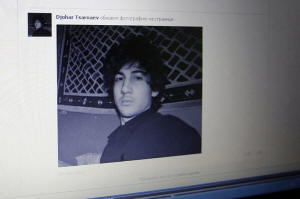US appeals court directs probe of juror bias in Boston Marathon bomber's
case
 Send a link to a friend
Send a link to a friend
 [March 22, 2024]
By Nate Raymond [March 22, 2024]
By Nate Raymond
BOSTON (Reuters) -A federal appeals court on Thursday directed the judge
who presided over Boston Marathon bomber Dzhokhar Tsarnaev's 2015 trial
to investigate whether two jurors were biased and should not have been
seated, creating potential grounds to overturn his death sentence.
The Boston-based 1st U.S. Circuit Court of Appeals stopped short of
granting Tsarnaev's latest bid to overturn his death sentence for his
role in the 2013 attack that killed three people and wounded 260 others.
But on a 2-1 vote, the panel concluded that U.S. District Judge George
O'Toole's earlier investigation into Tsarnaev's claims that two jurors
lied about whether they had discussed the case on social media before
being seated to hear his trial "fell short of what was constitutionally
required."
The U.S. Supreme Court had not addressed that argument when it restored
Tsarnaev's death sentence in 2022, after the 1st Circuit set it aside in
an earlier ruling in 2020, prompting a new round of arguments before the
appeals court.
Lawyers for Tsarnaev, 30, said one juror was told by a friend on
Facebook to "get on the jury" and send Tsarnaev "to jail where he will
be taken care of," while the second juror retweeted a Twitter post that
called Tsarnaev a "piece of garbage."
U.S. Circuit Judge William Kayatta, writing for the majority, said that
should the trial judge conclude that either juror should have been
disqualified, Tsarnaev would be entitled to a new penalty-phase trial to
determine if he should be sentenced to death.
"And even then, we once again emphasize that the only question in any
such proceeding will be whether Tsarnaev will face execution; regardless
of the outcome, he will spend the rest of his life in prison," Kayatta
wrote.
A spokeswoman for acting U.S. Attorney Joshua Levy, whose office
prosecuted the case, declined to comment. The U.S. Department of Justice
could either ask the full 1st Circuit to reconsider the case or try to
take it for a second time to the U.S. Supreme Court.
Lawyers for Tsarnaev did not respond to requests for comment. He is
currently being held in a "Supermax" prison in Florence, Colorado.
Tsarnaev and his older brother, Tamerlan, detonated two homemade
pressure-cooker bombs near the Boston Marathon's finish line on April
15, 2013. Tamerlan Tsarnaev died four days later after a shootout with
police.

[to top of second column]
|

A photograph of Djohar Tsarnaev, who is believed to be Dzhokhar
Tsarnaev, a suspect in the Boston Marathon bombing, is seen on his
page of Russian social networking site Vkontakte (VK), as pictured
on a monitor in St. Petersburg April 19, 2013. REUTERS/Alexander
Demianchuk/File Photo

Jurors found Dzhokhar Tsarnaev guilty on all 30 counts he faced and
said six warranted the death penalty, which was later imposed.
The Justice Department has defended Tsarnaev's death sentence
despite President Joe Biden's opposition to capital punishment and
Attorney General Merrick Garland's July 2021 moratorium on federal
executions.
The 1st Circuit had overturned Tsarnaev's sentence in 2020, saying
evidence about his brother's influence over him was wrongly
excluded, and that prospective jurors were not questioned enough
about their exposure to news about the bombings.
In reinstating Tsarnaev's death sentence, conservative Justice
Clarence Thomas wrote for a 6-3 Supreme Court majority that the
constitution "guaranteed him a fair trial before an impartial jury.
He received one."
Kayatta's opinion on Thursday was joined by U.S. Circuit Judge O.
Rogeriee Thompson, a fellow appointee of Democratic former President
Barack Obama.
U.S. Circuit Judge Jeffrey Howard, an appointee of Republican former
President George W. Bush, dissented, saying that given the relative
weakness of Tsarnaev's juror bias claims, it was within the broad
authority of O'Toole, the U.S. District Court judge, to not subject
the jurors to further questioning.
Victims of the bombing have been split for years over whether
Tsarnaev should be put to death, and Thursday's opinion re-exposed
those divides.
"My stance is he should already be dead," said Marc Fucarile, who
lost his right leg in the second blast. He said further court
proceedings would be a waste of time and money.
Mikey Borgard, who sustained hearing loss and a brain injury in the
attack, agreed with the ruling, saying further investigation was
needed "to ensure that justice has been fairly rendered and the
Constitution and law has been upheld."
(Reporting by Nate Raymond in Boston; Editing by Alexia Garamfalvi,
Stephen Coates and Leslie Adler)
[© 2024 Thomson Reuters. All rights reserved.]This material
may not be published, broadcast, rewritten or redistributed.
Thompson Reuters is solely responsible for this content. |